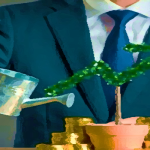From a venture investor’s diary #1: The power of thinking long-term, practicing a “craft”
- By ssyc1
- August 31, 2021
- No Comments
 Saw two companies that are not yet ready for their first institutional funding round.
Saw two companies that are not yet ready for their first institutional funding round.
Reminder to myself: need to be a long-term minded investor. Translation: there are always opportunities to hurry and to take a shortcut and to rush into deals; beware of this rather popular thing called “FOMO” (fear of missing out); I am building relationships.
Further reminder to myself: must practice and improve my skills in this craft called investing. Just reflect on lessons and practice some more. That would sharpen my skills.
Some further thoughts: five key attributes to long-term mindedness:
- Patience. Just like R&D work, venture investing requires patience, even if our goals are different.
- Optimism and belief. Good entrepreneurs are able to tap into strengths and invest into them, they are also able to do so using the resources that are available. There is this ability to focus on the “half-full” part of the glass; good venture investors can at least empathise with that optimism and belief, even if they are – helpfully – more clear-eyed than the entrepreneur.
- Commitment. Good founders are fully and long-term committed. They “live” and “breathe” the vision, and think about the product, the customers, and the team all the time. The long-term mindedness helps them make good decisions that make strategic sense. We are long-term committed investors (our investors’ money is literally called “commitment” and we’ve described it as a “term partnership”); they are able to support founders in these long-term and strategic decisions (and we expect the joint journey to involve debates and respectful disagreements if that happens, or as Annie Duke put it, an “organized skepticism” that involves making arguments and friends).
- Openness. All other things being equal, long-term mindedness makes it easier for us to be more open to contradicting evidence or views and more objective in assessing all types of data when coming to a decision. It is key to making the debates and discussions (mentioned in point 3 above) productive.
- A good “noise” filter and a willingness to ride the wave. The ability to filter out the noise and make some bets on long-term trends. Long-term mindedness also gives us a catalyst to think about long-term, structural, trends, and to “ride the wave” (and stay in it) where appropriate and when they arrive and continue. Need to focus on the wave and the major drivers as well as the qualities of the entrepreneur(s), but identify these using (and check intuition against) a more structured process; some of the details and challenges are not “deal-breakers” and can be managed over time.
A few more thoughts on long-term mindedness:
- Long-term mindedness ≠ blind faith: long-term mindedness is a way of dealing with uncertainties that starts from a healthy appreciation of it in the first place, and in the second, by developing the habits and discipline of assessing and analyzing (“intellectual honesty”), drawing out lessons, asking meaningful “what ifs”, and importantly, getting comfortable with “I don’t know”.
- There are parallels between what we need and what is needed in entrepreneurs (and what we require from them!).
- It is when everything can be automated, it is when we can be lazy and rely on algorithms, that things go wrong. Machines can’t do “judgements” quite yet, and while we can in principle programme machines to be “long-term minded”, things could become complicated as machines themselves can’t easily formulate “purpose” on its own.
- Finally, being a value-adding investor and being a long-term minded investor are related: my value-add to young companies requires me to deliver the tough messages when needed which itself requires me to be a long-term minded investor. It requires me (a) having established a relationship with the team that is based on honest and straight-forward dialogue, and (b) saying what needed to be said and risk getting pushback (and even temporary anger or unhappiness).






Leave a Reply